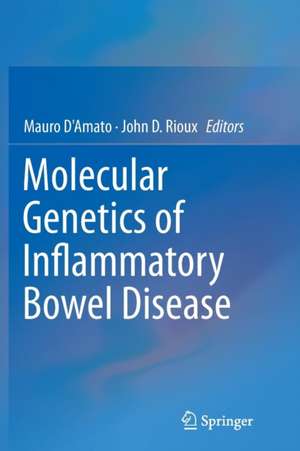Molecular Genetics of Inflammatory Bowel Disease
Editat de Mauro D'Amato, John D. Riouxen Limba Engleză Paperback – 22 aug 2016
Preț: 1097.71 lei
Preț vechi: 1155.48 lei
-5% Nou
Puncte Express: 1647
Preț estimativ în valută:
210.04€ • 219.89$ • 173.80£
210.04€ • 219.89$ • 173.80£
Carte tipărită la comandă
Livrare economică 05-19 aprilie
Preluare comenzi: 021 569.72.76
Specificații
ISBN-13: 9781493942565
ISBN-10: 1493942565
Pagini: 356
Ilustrații: XIII, 343 p. 23 illus. in color.
Dimensiuni: 155 x 235 x 19 mm
Greutate: 0.5 kg
Ediția:Softcover reprint of the original 1st ed. 2013
Editura: Springer
Colecția Springer
Locul publicării:New York, NY, United States
ISBN-10: 1493942565
Pagini: 356
Ilustrații: XIII, 343 p. 23 illus. in color.
Dimensiuni: 155 x 235 x 19 mm
Greutate: 0.5 kg
Ediția:Softcover reprint of the original 1st ed. 2013
Editura: Springer
Colecția Springer
Locul publicării:New York, NY, United States
Cuprins
Part 1: The Foundation of IBD Genetics, Human and Animal Studies.- A Primer on IBD: Phenotypes, Diagnosis, Treatment and Clinical Challenges.- Genetic Epidemiology of Inflammatory Bowel Disease, Early Twin and Family Studies.- Insights from Recent Advances in Animal Models of Inflammatory Bowel Disease.- Part Two: The Genetic and Molecular Makeup of Inflammatory Bowel Disease.- Complex Disease Genes and their Discovery.- The Genetics of Crohn's Disease.- Genetics of Ulcerative Colitis.- Genetic Overlap between Inflammatory Bowel Disease and Other Diseases.- Molecular Profiling of IBD Subtypes/Response to Therapy.- Epigenetics of Inflammatory Bowel Disease.- Part 3: Pathogenetic Pathways in Inflammatory Bowel Disease.- Nod1 and Nod2 and the Immune Response to Bacteria.- The IL-23-Th17 Axis in Intestinal Inflammation.- Inflammatory Bowel Disease at the Intersection of Autophagy and Immunity: Insights from Human Genetics.- The Epithelial Barrier.- Host Interactions with Bacteria: From “Entente Cordiale” to “Casus Belli”.- Cytokines in Inflammatory Bowel Disease.- Part 4: Concluding Remarks and Future Perspectives.- Towards Personalized Therapy in Inflammatory Bowel Disease.- Index.
Textul de pe ultima copertă
Inflammatory bowel disease (IBD) affects 1% of people worldwide. This condition is partly inherited, and genetic research has made enormous progress during the last few years, providing important insight into disease pathogenesis. This book provides a concise but complete overview of existing knowledge, with particular focus on the molecular and genetic mechanisms at the basis of IBD.
Invited experts, at the frontline of IBD research, introduce basic concepts in the pathophysiology of IBD and its two major forms Crohn’s disease and ulcerative colitis, provide a historical perspective and highlight latest discoveries of IBD genetic research, describe how this information has helped to unravel novel pathogenetic pathways, and formulate a vision for future investigations and their clinical application in IBD.
State-of-the-art information contained in this book is an exceptional resource for all those in the biomedical field with a specific interest in IBD, including basic scientists, gastroenterologists, GI specialist doctors and research nurses, but also medical and biomedical students.
Invited experts, at the frontline of IBD research, introduce basic concepts in the pathophysiology of IBD and its two major forms Crohn’s disease and ulcerative colitis, provide a historical perspective and highlight latest discoveries of IBD genetic research, describe how this information has helped to unravel novel pathogenetic pathways, and formulate a vision for future investigations and their clinical application in IBD.
State-of-the-art information contained in this book is an exceptional resource for all those in the biomedical field with a specific interest in IBD, including basic scientists, gastroenterologists, GI specialist doctors and research nurses, but also medical and biomedical students.
Caracteristici
Provides a complete review of existing knowledge of molecular genetics in inflammatory bowel diseases
Highlights the latest discoveries from molecular and genome-wide association studies
Gives insight into disease pathogenesis and potential targets for pharmaceutical intervention
Highlights the latest discoveries from molecular and genome-wide association studies
Gives insight into disease pathogenesis and potential targets for pharmaceutical intervention
